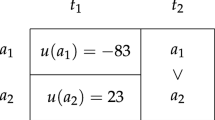Abstract
In recent attempts at deriving morality from rationality expected utility theory has played a major role. In the most prominent such attempt, Gauthier'sMorals by Agreement, a mode of maximizing utility calledconstrained maximization is defended. I want to show that constrained maximization or any similar proposal cannot be coherently supported by expected utility theory. First, I point to an important implication of that theory. Second, I discuss the question of what the place of constrained maximization in utility theory might be. Third, I argue that no matter how we answer this question, expected utility theory cannot provide the reason why a moral disposition like constrained maximization is to be preferred to its rivals.
Similar content being viewed by others
References
Binmore, K.: 1993, ‘Bargaining and Morality’, in D. Gauthier and R. Sugden (eds.),Rationality, Justice and the Social Contract, The University of Michigan Press, Ann Arbor, pp. 131–156.
Buchanan, J. F.: 1988, ‘The Gauthier Enterprise’, in E. F. Paul, F. D. Miller, J. Paul, and J. Ahrens (eds.),The New Social Contract, Basil Blackwell, Oxford, pp. 75–94.
Danielson, P.: 1991, ‘Closing the Compliance Dilemma: How it's Rational to be Moral in a Lamarckian World’, in P. Vallentyne (ed.),Contractarianism and Rational Choice, Cambridge University Press, Cambridge, pp. 291–322.
Gauthier, D.: 1986,Morals by Agreement, Clarendon Press, Oxford.
Gauthier, D.: 1990, ‘Economic Man and the Rational Reasoner’, in J. H. Nichols and C. Wright (eds.),From Political Economy to Economics and Back?, ICS Press, San Francisco, pp. 105–131.
Gauthier, D.: 1993, ‘Uniting Separate Persons’, in D. Gauthier and R. Sugden (eds.),Rationality, Justice and the Social Contract, The University of Michigan Press, Ann Arbor, pp. 176–192.
Harsanyi, J. C.: 1977,Rational Behavior and Bargaining Equilibrium in Games and Social Situations, Cambridge University Press, Cambridge.
Hegselmann, R.: 1989, ‘Rational Egoism, Mutual Advantage and Morality — A Review-Discussion of D. Gauthier: Morals by Agreement’,Erkenntnis 31, 143–159.
McClennen, E. F.: 1988, ‘Constrained Maximization and Resolute Choice’, in E. F. Paul, F. D. Miller, J. Paul and J. Ahrens (eds.),The New Social Contract, Basil Blackwell, Oxford, 95–118.
Messerly, J.: 1992, ‘The Omission of Unconditional Cooperators: A Critique of Gauthiers's Argument for Constrained Maximization’,Philosophical Studies 67, 19–39.
Nida-Rümelin, J.: 1993, ‘Practical Reason, Collective Rationality and Contractarianism’, in D. Gauthier and R. Sugden (eds.),Rationality, Justice and the Social Contract, The University of Michigan Press, Ann Arbor, pp. 53–74.
Smith, H.: 1991, ‘Deriving Morality from Rationality’, in P. Vallentyne, (ed.):Contractarianism and Rational Choice, Cambridge University Press, New York, pp. 228–253.
Taylor, M.: 1987,The Possibility of Cooperation, Cambridge University Press, Cambridge.
Author information
Authors and Affiliations
Rights and permissions
About this article
Cite this article
Lottenbach, H. Expected utility and constrained maximization: Problems of compatibility. Erkenntnis 41, 37–48 (1994). https://doi.org/10.1007/BF01128909
Received:
Revised:
Issue Date:
DOI: https://doi.org/10.1007/BF01128909



